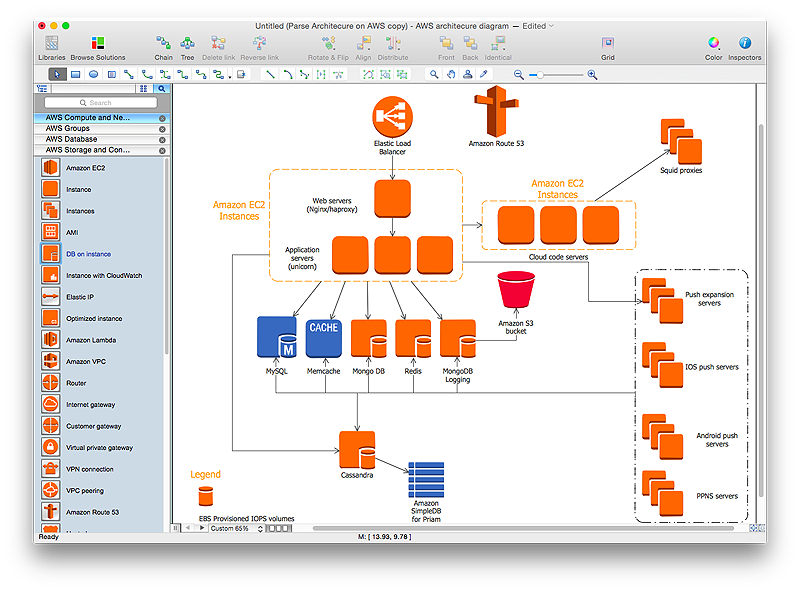
3 Tier Software Architecture Diagram Visio
Jan 21, 2019 - N-Tier architecture is an industry-proven software architecture model. Examples of Database – MySQL, SQL Server, and Oracle Database are some. By looking at the below diagram, you can easily identify that 3-tier.
What is N-Tier? An N-Tier Application program is one that is distributed among three or more separate computers in a distributed network. The most common form of n-tier is the 3-tier Application, and it is classified into three categories. • User interface programming in the user's computer • Business logic in a more centralized computer, and • Required data in a computer that manages a database.
This architecture model provides Software Developers to create Reusable application/systems with maximum flexibility. In N-tier, 'N' refers to a number of tiers or layers are being used like – 2-tier, 3-tier or 4-tier, etc. It is also called “ Multi-Tier Architecture”. The n-tier architecture is an industry-proven software architecture model. It is suitable to support enterprise level client-server applications by providing solutions to scalability, security, fault tolerance, reusability, and maintainability. It helps developers to create flexible and reusable applications.
In this tutorial, you will learn- • • • • • • • • N-Tier Architecture A diagrammatic representation of an n-tier system depicts here – presentation, application, and database layers. N Tier Architecture Diagram These three layers can be further subdivided into different sub-layers depending on the requirements. Some of the popular sites who have applied this architecture are • MakeMyTrip.com • Sales Force enterprise application • Indian Railways – IRCTC • Amazon.com, etc. Some common terms to remember, so as to understand the concept more clearly. • Distributed Network: It is a network architecture, where the components located at network computers coordinate and communicate their actions only by passing messages. It is a collection of multiple systems situated at different nodes but appears to the user as a single system. • It provides a single data communication network which can be managed separately by different networks.
• An example of Distributed Network– where different clients are connected within LAN architecture on one side and on the other side they are connected to high-speed switches along with a rack of servers containing service nodes. • Client-Server Architecture: It is an architecture model where the client (one program) requests a service from a server (another program) i.e. It is a request-response service provided over the internet or through an intranet. In this model, Client will serve as one set of program/code which executes a set of actions over the network.
While Server, on the other hand, is a set of another program, which sends the result sets to the client system as requested. • In this, client computer provides an interface to an end user to request a service or a resource from a server and on the other hand server then processes the request and displays the result to the end user. • An example of Client-Server Model– an ATM machine. A bank is the server for processing the application within the large customer databases and ATM machine is the client having a user interface with some simple application processing.
• Platform: In computer science or software industry, a platform is a system on which applications program can run. Chertezh toroidaljnij generator steven marka. It consists of a combination of hardware and software that have a built-in instruction for a processors/microprocessors to perform specific operations.
• In more simple words, the platform is a system or a base where any applications can run and execute to obtain a specific task. • An example of Platform – A personal machine loaded with Windows 2000 or Mac OS X as examples of 2 different platforms. • Database: It is a collection of information in an organized way so that it can be easily accessed, managed and updated. • Examples of Database – MySQL,Server, and Oracle Database are some common Db's. Types of N-Tier Architectures There are different types of N-Tier Architectures, like 3-tier Architecture, 2-Tier Architecture and 1- Tier Architecture. First, we will see 3-tier Architecture, which is very important.
3-Tier Architecture By looking at the below diagram, you can easily identify that 3-tier architecture has three different layers. • Presentation layer • Business Logic layer • Database layer 3 Tier Architecture Diagram Here we have taken a simple example of student form to understand all these three layers. It has information about a student like – Name, Address, Email, and Picture. User Interface Layer or Presentation Layer Presentation Layer.